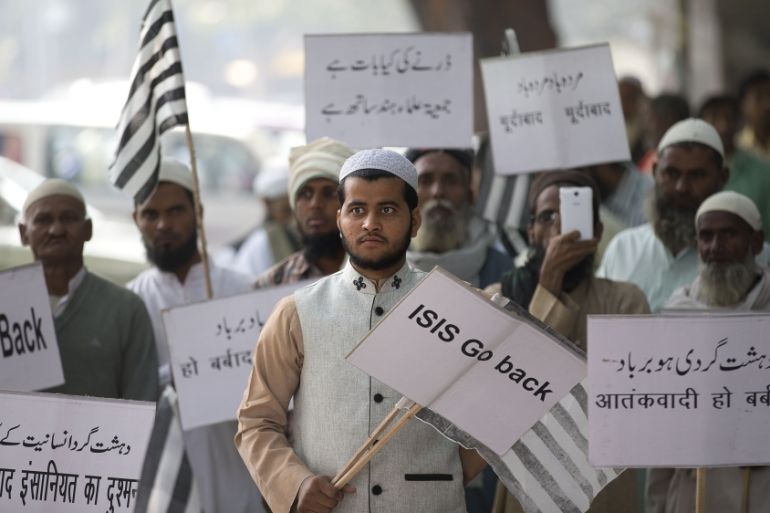Indian Muslims protest against deadly ISIL attacks
Activists from prominent religious group hold demonstrations across India against rising attacks by ISIL.

A prominent Muslim group in India organised protests across the country against recent deadly attacks in France, Lebanon, and Turkey by the Islamic State of Iraq and the Levant (ISIL).
“Islam doesn’t permit killing of innocents. Since most of the killings are being done in the name of Islam and jihad, that’s why it is our religious duty to raise our voice against the act,” Maulana Mahmood Madani, chief of Jamiat-Ulama-i-Hind, told Al Jazeera.
Keep reading
list of 4 itemsMoscow theatre attack suspects show signs of beating in court
Four men showing signs of severe beating charged over Moscow concert attack
Russia mourns Moscow concert hall attack victims as death toll rises to 137
Thousands of Muslims across dozens of cities came out on the streets on Wednesday chanting slogans and raising banners against ISIL and its affiliated groups, Madani said.
“It’s a conspiracy to bring a bad name to the Quran, Islam, and the Prophet. We have to fight against this conspiracy. It’s a jihad for us. Those [ISIL] who are doing this are really Allah’s rebels,” the Jamiat leader said.
The activists held placards with messages reading “ISIS is a threat to humanity,” and “Stop ISIS everywhere.”
“We have received huge support. Almost all Muslim organisations have joined us from across India,” said Madani.
According to media reports, a handful of Muslims out of a population of more than 160 million have so far joined ISIL in Iraq and Syria.
![The activists held placards with messages reading 'ISIL is a threat to humanity' and 'Stop ISIL everywhere' [Manish Swarup/AP]](/wp-content/uploads/2015/11/1502900fe82740dfa62c680c1532bea3_18.jpeg)
Irfan Ahmad, associate professor of political anthropology at the Australian Catholic University, Melbourne, told Al Jazeera the Indian protesters demonstrated because they have been stigmatized over the false notion that they support terrorism.
“They are protesting to escape a well-coordinated, mediatised stigma according to which Muslims support ‘terrorism’. One is unsure if they would be permitted to be successful because the stigma exists and persists independently of them and the facts on the ground,” Ahmad said.
“Don’t most Muslims decry terrorism in the same way most believers of other religions do?” said Ahmad, author of the book Islamism and Democracy in India.
Jamiat, one of India’s leading Islamic groups, was founded in 1919 and participated in India’s freedom struggle. It was the first Indian religious body to issue a fatwa, or edict, against terrorism in 2008.

Addressing ISIL by its Arabic name, Daesh, Madani said the group uses Islam as a pretext for its violence, “But we want to say that Islam has got nothing to do with terrorism.”
On Tuesday, India’s interior ministry issued an advisory that attacks by ISIL were possible in the country.
But Ahmad said the ISIL threat in India was overblown.
“They forcibly connect ISIL to India to legitimise their own divisive domestic interests by stigmatising, even terrorising, Indian Muslims,” he said.
India has witnessed several deadly bomb blasts in the past. In 2008, the financial hub of Mumbai was the scene of a Paris-like assault by gunmen that killed 166 people over several days.
“We have to be vigilant about Muslim youth so that they don’t fall prey to the ISIL propaganda,” Madani said. “We will bring awareness among people that this is not Islam.”
![Thousands of Muslims across dozens of cities came out on the streets against ISIL [Manish Swarup/AP]](/wp-content/uploads/2015/11/e29fbfc005704be4aded62de87437f5e_18.jpeg)